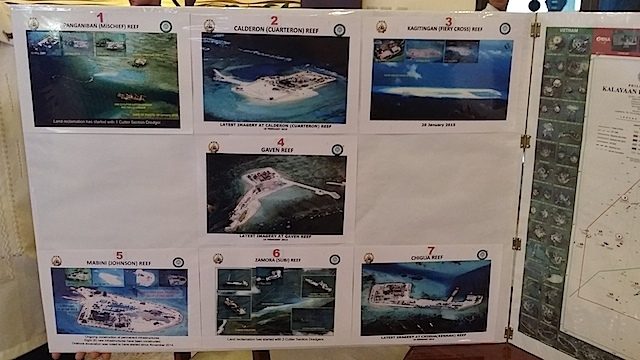SUMMARY
This is AI generated summarization, which may have errors. For context, always refer to the full article.

KINGSTON, Jamaica – US President Barack Obama warned Thursday, April 9, that China shouldn’t “elbow aside” countries it is in conflict with in the South China Sea, where the United States has sounded an alarm over Chinese construction on disputed islands.
Speaking from a town hall meeting while on a visit to Jamaica, Obama warned against aggressive acts by China while at the same time welcoming its strong economy and global reach.
“Where we get concerned with China is where it is not necessarily abiding by international norms and rules and is using its sheer size and muscle to force countries into subordinate positions, and that is the concern we have around maritime issues,” Obama said responding to a question about the South China Sea.
“Just because the Philippines or Vietnam are not as large as China doesn’t mean that they can just be elbowed aside.”
His comments come as the US warned that Chinese efforts to enlarge and build up disputed islands in the South China Sea are a threat to regional stability.
A newly released set of satellite images revealed that China is artificially expanding a reef in disputed waters, presumably to strengthen its territorial claims.
“In our view, China’s land reclamation and the construction activity are fueling greater anxiety within the region,” State Department spokesman Jeff Rathke told reporters.
Rathke said Washington is concerned that China “might militarize outposts on disputed land features of the South China Sea.
“So we are watching these developments closely and we continue to raise our concerns with China as well as with others in the region to urge all parties to avoid destabilizing activities.”
Obama said diplomatic dialogue is the best way to address the South China Sea dispute.
The US leader was also careful to emphasize that despite disputes with Beijing, China’s economic power plays a positive role in the world, and said the US “welcomes” global aid investments.
“We should be more fearful of a poor collapsing China than a China that is participating in the world marketplace,” he said.
Satellite images on the website of the Center for Strategic and International Studies show a flotilla of Chinese vessels dredging sand onto a feature known as Mischief Reef.
Images of other outcrops in the Spratly Islands show aircraft runways appearing from jungle, smooth-sided solid masses where there once was coral and man-made harbors replacing natural reefs.
Analysts say the pictures show how China is attempting to create “facts in the water” to bolster its territorial claim.
Beijing asserts sovereignty over most of the South China Sea, including areas near the coasts of other states, using a line that first appeared on Chinese maps in the 1940s.
The Philippines, Vietnam, Malaysia, Brunei, and Taiwan all have overlapping claims.
The United States has no claim of its own, but broadly supports its Asian allies against Chinese pressure and has asserted that freedom of navigation is in its national interest. – Rappler.com
Add a comment
How does this make you feel?
There are no comments yet. Add your comment to start the conversation.